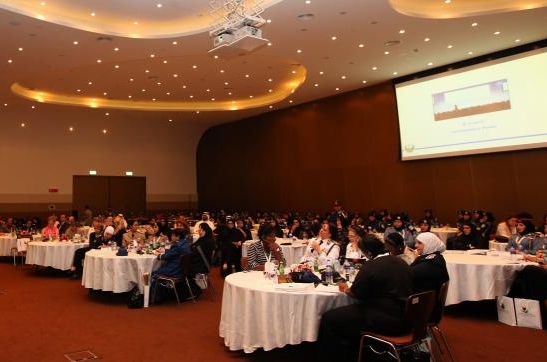
Third Regional Women Conference Concludes in Abu Dhabi
The Third Regional Women Conference concluded its activities yesterday at Zayed University’s Convention Center in Khalifa City Abu Dhabi. Organized by the Emirates Women Police Association (EWPA) under the theme, ‘Women Police ... the Leadership of Sustainable Development’, the Conference reviewed and discussed various topics related to policing.
On the third day, the conference witnessed four workshops. The first workshop tackled the Emirati project to replace the expression ‘Evidence Collection Process’ with ‘Evidential Investigation’. The lecture was delivered by Dr. Abdullah Ahmad Al Sheikh, Associate Professor of Criminal Investigations at the Police College.
The lecturer discussed the aspects of extraordinary investigations carried out by the judicial officers; the tasks entrusted to the police in criminal cases; and the Emirati project for criminal case procedures, in addition to the anticipated results and coveted goals, and required amendments.
The second workshop, which was moderated by First Lieutenant Elham Al Muaini, Head of the Innovation Section at the Ministry of Interior focused on developing skills, innovation, and creativity. The lecturer spoke about the concept of innovation and its importance, as well as the role of leaders in implementing the concepts of innovation, providing an innovative work environment, and qualifying human resources.
She also discussed the UAE Vision; the innovation trends, and the government innovation channels. She also shed the light on the Ministry of Interior’s innovation strategy and its vision, to ensure that the UAE remain one of the safest and most secure countries in the world.
In the third workshop, Colonel Abdul Rahman Al Owais, Deputy Director General, Anti-Narcotics Federal General Directorate at the Ministry of Interior, gave an overview on synthetic drugs and their impact on national economy. He also explained the manufacturing methods of synthetic drugs, and their adverse effects on individuals and society.
He also reviewed the different types of drugs and the adverse effects on health, society, economy and on security, caused by the prevalence of this scourge amongst community members. Colonel Al Owais also stressed the UAE’s commitment to contribute efforts in the fight against drugs, by reinforcing cooperation and coordination with other countries.
Moreover, Colonel Al Owais pointed out to the efforts exerted by the UAE to combat synthetic drugs. To this end, the competent authorities in the UAE are enacting laws and taking the appropriate measures to combat the prevalence of this scourge, as well as organizing training and awareness programs to boost community members’ awareness about the dangers of drugs.
The fourth workshop, delivered by Captain Ghaida Ali Abdullah, from the Criminal Investigation Department at the Abu Dhabi Police, focused on cybercrimes. The lecturer tackled the concept of cybercrimes, and highlighted the efforts exerted by the Abu Dhabi Police to track down and prevent such crimes by establishing the electronic evidence forensic laboratory at the CID.
She explained the objectives of the laboratory, which include collecting and analyzing electronic evidence to support police work and counter cybercrimes.
In conclusion, a panel session was organized in order to answer questions and inquiries of participants at the workshops.
Major Amnah Mohammed Al Bloushi, Chairwoman of the Emirates Women Police Association (EWPA) honored the lecturers who delivered the workshops, and exchanged commemorative shields with participating delegations.
The closing ceremony was attended by Brigadier Ahmed Mohammed Nehkairah, Head of Human Rights Department at the Ministry of Interior; Colonel Saif Saeed Al Shamesi, Head of the Cultural and Social Activities Section at the Clubs Department; Lieutenant Colonel Khaled Abdullah Al Khouri, Police College Deputy Director; in addition to a number of officers, male and female cadets, and female university students at the Police College.
It is worth mentioning that the conference, which took place at Zayed University’s Convention Center in Khalifa City Abu Dhabi, included a flurry of activities on the second day. Participants reviewed and discussed a number of security topics.
Four workshops were held on the second day of the conference. The first workshop tackled ‘Modern strategies to develop perceptions and sense of security’. The workshop was moderated by Colonel Khalifa Mohammed Al Zaabi, Head of the Employees Performance Appraisal Department at the Ministry of Interior.
Colonel Al Zaabi discussed the importance of social media and the proper ways to deal with these sites and protect privacy. He stressed the importance of refraining from publishing personal photos in order to maintain one’s personal security.
The second workshop tackled the appropriate methods to combat intellectual radicalism. Lieutenant Colonel Salem Abdullah Al Habsi, from the General Directorate of Central Operations at the Ministry of Interior, gave an overview of intellectual radicalism, its causes and the connection between intellectual radicalism and terrorism. He also discussed the role of women in the fight against terrorism, as well as the efforts and role of the UAE in fighting leaders of violence, extremism, and terrorism.
Lieutenant Colonel Al Habsi emphasized the valuable role of women in combating radicalism within society, by instilling the proper and righteous behaviors in community members. He said: “The UAE has dedicated significant attention to support and empower women, by providing them with the necessary resources to enable them to assume highest positions.”
The lecturer also noted that the UAE have signed many agreements and conventions that denounce violence and radicalism, and issued numerous laws and legislations that reflect their commitment to fighting radicalism and terrorism, as well as protecting human and child rights.
In conclusion, Lieutenant Colonel Al Habsi noted that terrorism and radicalism have no religion, race, country, or nationality; stressing that the UAE is committed to spreading values of tolerance and moderation among community members.
Colonel Dr. Eng. Ibrahim Hamad Al Hinai, Deputy Head of the Diwan Department at the Abu Dhabi Police, presented the third workshop. He discussed big data governance, the challenges that face the Security Information Department and its role in providing decision-makers with accurate security data and information.
The fourth workshop tackled the topic of combating corruption in organizations. Lt. Colonel Matar Al Muhairi, Head of the Anti-Corruption Department at the Abu Dhabi Police, gave a definition of corruption according to the Islamic doctrine, and to international organizations. He also shed the light on examples of corruption, its causes and prevalence in institutions, as well as its adverse impacts. He also discussed the means to combat corruption by raising awareness of community members, instilling righteous behaviors, and encouraging community members to report corruption.
Lt. Colonel Al Muhari gave an overview of the efforts exerted by the UAE in the fight against corruption, by acceding to the United Nations Convention against Corruption, and marking the International Anti-Corruption Day.
Towards the end of the second day, a panel session was organized in order to answer questions and inquiries of participants at the workshops.
Major Amnah Mohammed Al Bloushi, Chairwoman of the Emirates Women Police Association (EWPA) honored the lecturers who delivered the workshops, and exchanged commemorative shields with some participating delegations.





























